 Your new post is loading...
 Your new post is loading...
Political tensions have reached a point where some brands are perceiving mainstream news outlets as too controversial, leading media buyers to pull ads from those sites. One campaign manager at a holding group media agency said a major automaker decided last month to stop serving ads in the news category in case the content didn’t align with the brand’s values. Then, after violence erupted in Charlottesville, Virginia, the agency blocked keywords including “Nazis” and “Charlottesville” in programmatic campaigns for the brand. This exec, like the other three media agency executives interviewed for this story, spoke on condition of anonymity due to political sensitivities. The executive said the blocked news category contains hundreds of publishers, including foxnews.com, which also is the only mainstream news site that has been on the agency’s blacklist since March....
Every business must serve a social purpose”. These are not the words of a social campaigner or a politician; they are the words of a banker, Ashok Vaswani, the CEO of Retail and Business Banking at Barclays, one of the world’s largest banks. Barclays has been involved in at least one major trading scandal and holds the dubious honour of the most fined bank in Britain. There will be some people who will treat his words with understandable cynicism but that would be to miss the point.
The point is not whether the words are sincere or not – it is that they should have been said at all. Banks are concerned with the control of money, why should they concern themselves with any purpose beyond that? The reason is that society is demanding they do. When banks first started they fulfilled a social need in the community, to enable ordinary people to fund their ambitions. Over the years banks forgot that purpose and focused most of their efforts on funding their own ambitions through obscene profits, often at the consumer’s expense. The bubble burst in spectacular fashion with the downfall of Lehman Brothers in the US and RBS in the UK.
It isn’t just the banks that have lost their way. Now it’s critical for any business to demonstrate it has a purpose before, and beyond profit; that it seeks to improve the lives of its customers as a primary goal. Failure to have such a purpose, to be clear about it and to ensure it directs everything you do, will lose customers, employees and ultimately business value....
What’s in it for them?” is, perhaps, the most important question that you can ask yourself before you enter into cause-related business (or any business, for that matter). So often, marketers know a ridiculous amount about their product, their points of differentiation, their mission or even their cause, yet when asked about their customer, they run out of things to say rather quickly.
The secret to fostering engagement with your customers lies in knowing what they are really buying from you. If you want your business to do good, it better be the kind of good that people care about. People save the cute and cuddly animals first. Baby fur seals and koalas are far easier to rescue than the blowfish. This is not to diminish the importance of any cause, but if we fail to be honest about the way that consumers buy and buy in, then we fail to understand the nature of “good” in business....
Pinpoint Market Research reports that “twenty-somethings” want something more from brands than just a product or service; they want social, political and community action. The market research company surveyed 1,650 men and women aged twenty to twenty-nine in the U.S. about social issues and brand engagement.
What They Want From Brands And The Social Issues That Matter To Them: - Seventy-nine percent choose or boycott companies based on the brand’s allegiance to social issues - Eighty-eight percent want to see brands “effecting real change” in the communit - The issues they most care about: online privacy (31%); America’s debt/deficit (22%); climate change (20%); GLBT rights (15%); net neutrality (7%); police brutality/excessive force (5%)...
Pro-social brands are the next step for companies looking to morally engage with consumers. Driven by marketers who are moving beyond claims of sustainability and into strong stands on relevant social issues, this trend picked up momentum in 2014. It will be positively explosive in 2015.
So what’s the difference between sustainable and pro-social brands?A traditional sustainable brand expects that customers will laud and applaud it for its charitable giving and its actions on key environmental issues. It’s the classic, safe, (usually) apolitical “vote with your dollars” approach: sustainable brands tell stories that cast them in the role of hero and expect audiences to simply play the role of starry-eyed hero-worshipper....
Australians are increasingly favouring ethical brands, with more than three quarters of respondents to a Havas PR study showing some conscientious consumption. In the past, almost three fifths of respondents reported failing to act conscientiously.
In case you missed it, Bloomberg Businessweek published an intriguing story yesterday by veteran journalist Paul M. Barrett that ran with the headline “What It’s Like to Be Attacked by Putin’s Flack.”
The “flack” in question is Ketchum — more specifically D.C.-based partner Kathy Jeavons, who “heads both the Ecuador and Russia accounts” for the firm.
For the record, Jeavons did not personally attack or even contact Barrett. But a source did forward him a talking points document that the firm wrote for Nathalie Cely, Ecuador’s ambassador to the United States. The doc included both well-stated observations about Ecuador’s history with Chevron and suggestions for casting doubt on the credibility of Law of the Jungle, Barrett’s upcoming book on the lawsuit that accuses the company of abusing its relationship with the people of Ecuador....
The Nielsen Global Survey on Corporate Social Responsibility, a survey of 30,000 people in 60 countries, found that 55% of respondents are willing to shell out more money for socially responsible products--but the numbers vary depending on the region.
In Asia-Pacific, 64% of consumers are willing to pay more. The numbers are similar in Latin America and the Middle East/Africa, but in North America, the percentage drops to 42%. Just 40% of Europeans report that they would pay extra.Asia-Pacific respondents are also more likely to consider purchase decisions based on packaging (specifically, whether a brand says that's socially and environmentally responsible). Again, Europeans and North Americans are least likely to do this.
Millennials are most likely to pay extra, check product packaging, and work for companies that they perceive to be sustainable, according to the survey....
Hidden in plain sight, the controversial oil fields are an industrial expanse where forests once stood....
...Even when you round a certain bend and see some of the view, it’s hard to grasp the scale: This is a place where trucks are literally the size of houses, storage tanks are the size of football fields, and machines for processing the oil are the size of small office buildings. When the oil fields are fully developed, they'll cover an area the size of the state of Florida....
In a consumer-driven economy, the good a company does is increasingly becoming its defining competitive advantage. While CSR, cause marketing and sustainability might have seemed like nice-to-dos just a few years ago, articulating your brand's core values is now critical in terms of the reputational, employee productivity, and bottom line impact to your company.
As Rich Fernandez, Director of Executive Development at Google, said recently at Sustainable Brands '13, If a company's product is not improving lives, it's diminishing them." In the face of rising consumer activism, Marketing 3.0 will be won by those who become purpose-driven social brands. To do so, the CMO, CSO, CSR, and Foundation leads must align to bring a cohesive brand story to life that clearly defines the company's "social license to operate....
Some of the worst PR stories for fashion retailers happened in recent weeks. But will it cause any major upset of the business’ financial performance. It’s been a dreadful couple of weeks for garment workers and fashion retailers. There was a glimmer of joy this week when Bangladesh rescuers found a survivor 17 days after a garment factory collapsed and killed more than 1,000 workers. Then last week, teen idol retailer Abercrombie & Fitch stirred up a social media controversy when CEO Mike Jeffries confessed A & F would never make sizes XL for women because the brand is targeted toward “the cool kids”....
Because firms don't need to disclose political contributions, we don't know who's lobbying for what.are you Newsweek just released its fourth annual Green Rankings, grading the "greenness" of the 500 largest publicly-traded companies in the world. In partnership with research firms Trucost and Sustainalytics, companies are ranked based on their management, performance, and transparency in the environmental domain. One of us (Toffel) was a member of Newsweek's advisory panel. Thanks to that involvement and our research on green ratings, we understand the many challenges of rating firms' environmental performance. While leading assessments like Newsweek's are admirably rigorous and comprehensive, all major green rankings have an important blind spot: They do not account for corporate lobbying and campaign contributions around environmental policy. After all, no matter how green a company's operations and supply chains are, political efforts aimed at weakening environmental laws and regulations can have far greater environmental impact. Unfortunately, we know little about corporate political activities since much of it occurs behind closed doors. So whether companies are pushing to strengthen environmental regulations or lobbying to weaken them, none of this crucial information is incorporated into green rankings. You might think that companies that are transparent on environmental issues would also be forthcoming about their political activities. But perhaps not....
The moral obligations and competing values of corporations have been debated since the dawn of the Industrial Revolution: How do corporate leaders drive for profit maximization while ethically meeting the needs of communities and citizens? In the age of globalization and worldwide communications revolutions, these issues have taken a new turn. Activists in democratic countries have tried to get governments and companies to halt or limit the sale to authoritarian regimes of technologies that can be used to track, target, jail, or kill dissidents. Advocacy efforts are also being targeted at trying to convince technology companies not to allow their products to be used to spy upon, censor, block access to content, or thwart the public’s use of Internet-based tools that allow people living in authoritarian states to bring their issues to fellow citizens and allies abroad.... [A must-read for corp social responsibility pros - JD ]
|
The Body Shop’s content strives to inform current customers about its history and raise awareness for the work they do. The majority of its global content marketing focuses on its corporate social responsibility programs and social good messaging. Social media is key for the company, and YouTube is as an especially strong channel. One ongoing video series is tutorials for upcycling Body Shop packaging into creative, new items. Another series details from where The Body Shop sources ingredients and packaging, like paper from the Himalayan Bansbari community, and tea tree oil from the foothills of Mount Kenya....
So when new research is published that explains how business can actually improve profits by thinking about the world at large, it's exciting to read and it needs to be shared.
The 2015 Cone Communications/Ebiquity Global CSR Study reveals that consumers care more about the world than ever before, and they spend their money with companies that share that belief. Here are just a few important takeaways:
Consumers Know More, Research More, and Make More Informed
Decisions That Put the World FirstCone calls today's consumers "empowered." Meaning that they read more reviews, talk to their social networks, and do more research about products, and the companies behind them. And if they don't like what they see, the go elsewhere....
Products of caring companies are seen as superior
New research just released shows that corporate social goodwill can elevate a company’s profits by improving consumers’ perceptions of its products, but only when it’s seen as genuine.[Chernev, Alexander and Sean Blair (2015), “Doing Well by Doing Good: The Benevolent Halo of Social Goodwill” Journal of Consumer Research Summary]
New research shows that social goodwill increases the perceived quality of your products
Your products will only be perceived as better when your Social Responsibility Policies are motivated by an authentic values-led strategy, rather than thinly-veiled self-interest and hopeful publicity...
The Marketing Society defines marketing’s primary role as follows: “To create sustainable growth by understanding, anticipating and satisfying customer need”.
We invest serious resources to probe, sense and respond to customer needs, yet we disregard the fact that well-being is just as much a consumer need. Not addressing it could potentially drive down demand.
Well-being goes beyond the individual to the community and all the way to the planet that we inhabit.If we overlay this with the fact that concern for a consumer’s well-being is one manifestation of corporate social responsibility (CSR), it becomes apparent that marketers have a reason to be actively engaged in CSR...
More than half (55%) of global respondents in the survey said they are willing to pay extra for products and services from companies that are committed to positive social and environmental impact—an increase from 50 percent in 2012 and 45 percent in 2011. Regionally, respondents in Asia-Pacific (64%), Latin America (63%) and Middle East/Africa (63%) exceed the global average and have increased 9, 13 and 10 percentage points, respectively, since 2011.
While a willingness to pay extra for sustainable products is comparatively lower in North America (42%) and Europe (40%), both regions show an increase in purchasing sentiment from 2011, rising 7 and 8 percentage points, respectively....
Investigating the gun industry, Muslim extremists, and high-stakes litigation, I’ve grown accustomed to deadline intimidation from corporate legal departments or an executive’s personal PR squad, but only this week am I getting a feel for what it’s like to be the target when a sovereign nation goes into crisis-communication mode.
Worried about revelations in Law of the Jungle, my soon-to-be-released book about the epic Chevron (CVX) oil pollution case, the Republic of Ecuador’s U.S. public relations advisers, New York-based Ketchum, has sent a six-page, single-spaced memo to Ecuador’s ambassador to the U.S., Nathalie Cely. Marked “reservado y confidencial,” the memo, prepared in Spanish throughout, outlines “difficult questions” the book raises “that negatively affect Ecuador,” and includes an ad hominem swipe. “It remains unclear when and how many times Barrett visited Ecuador or if he interviewed anyone from the Government,” the memo states. “This can be converted into a point that we can raise, but only in suitable settings and among appropriate journalists.”
I obtained a copy of the memo from a helpful noncombatant who works for neither Ketchum nor the ambassador and who requested anonymity for all the obvious and usual reasons. The damage-control document is a peculiar combination of advice on how to discredit the messenger—“this can be converted into a point …”—and admissions that the book raises issues that do not reflect well on Ecuador’s government....
Consumer awareness and interest in social responsibility and sustainability has never been higher, and recent trends suggest that momentum is picking up. In fact, findings from a recent global survey reveal that about 55% of consumers around the globe are willing to pay more for products that are responsible and sustainable, up 5% from just a year ago. And as Amy Fenton, Nielsen's global leader of public development and sustainability, comments, brands looking to win with consumers need to be tuned in to the fact that many people now expect companies to be responsible....
Transparency can look different depending on the audience and the context. Find out which brands exemplify what it means to be transparent today.
Openness has never been more important in marketing and in business. Being transparent begins with knowing your customers—it requires having a relationship with your community of customers and engaging in ongoing dialogue, and many brands are increasingly turning to an online insight community to enable this type of deep engagement and learning.
As the examples below show, transparency can look different depending on the audience and the context. Here are 5 brands that provide examples of what it means to be transparent today....
The biggest challenge with cause marketing is convincing businesses of the value of supporting a cause. Sure, it’s good for society, and that reason is as good as any. But businesses of all sizes need marketing to deliver a bottom-line benefit. They can’t make an exception for cause marketing.Businesses are smart to set the bar high for cause marketing. That’s why I’m sharing five reasons why they should support a cause...
To be successful in reaching Millennials, businesses need to give themselves the freedom to re-think their entire marketing strategy. To achieve their business objectives businesses need to communicate effectively with the values of consumers. Brands that are becoming more socially conscious today will positively affect their bottom-line, their communities, and the world of tomorrow.
In a telephone interview with David Burstein, author of "Fast Future: How the Millennial Generation is Shaping Our World," he said Millennials are highly connected to and are extremely conscious of their values. They "see the world from a values perspective," he continued, "Reaching Millennials requires a real investment [from brands and organizations] in social responsibility."...
MHPM Project Managers has taken a different approach with the release their first CSR (Corporate Sustainability Report). Instead of the normal text report that other companies release, MHPM created an infographic poster with all of their sustainability information. It serves as a great example to their clients of how even CSR data can be designed in an engaging way. [Innovative model and CSR reporting tool~ Jeff]
Five things public companies can learn about corporate governance from the Freeh investigation of Penn State. "We protect our reputations by doing the right thing, not by hiding our failings. Indeed, even amid discovery of error and wrongdoing, reputations are enhanced by acknowledging, dealing with them immediately and directly, and working to minimize their recurrence." -- Edward Queen, Director of the D. Abbott Turner Program in Ethics and Servant Leadership at Emory University's Center for Ethics in Atlanta
Wiser words have never been written in light of the Penn State disaster uncovered this week with the conclusion of former FBI Director Louis Freeh's investigation....
|



 Your new post is loading...
Your new post is loading...



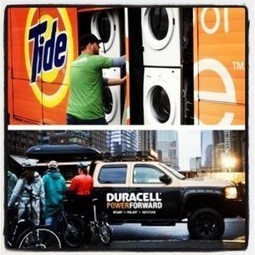


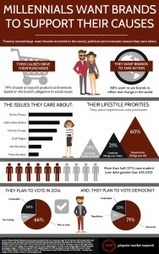










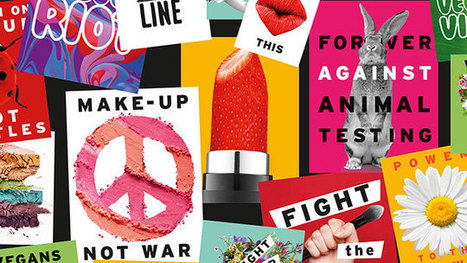

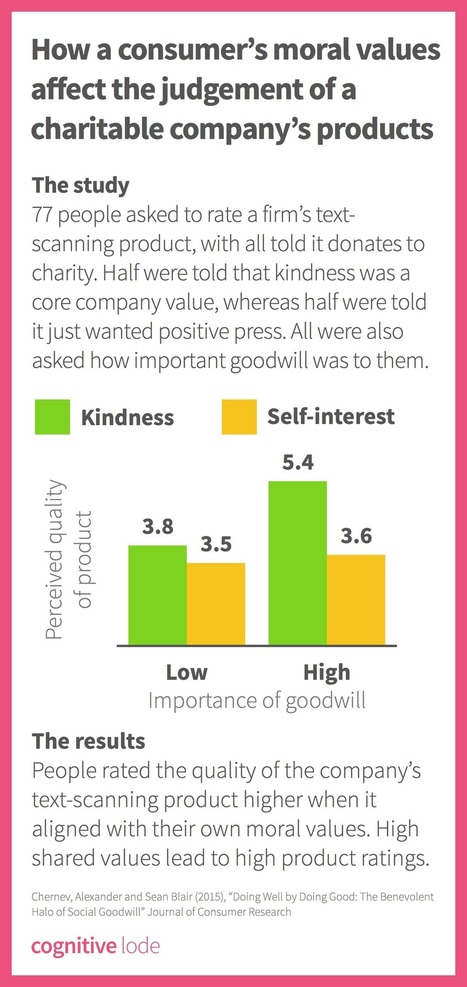

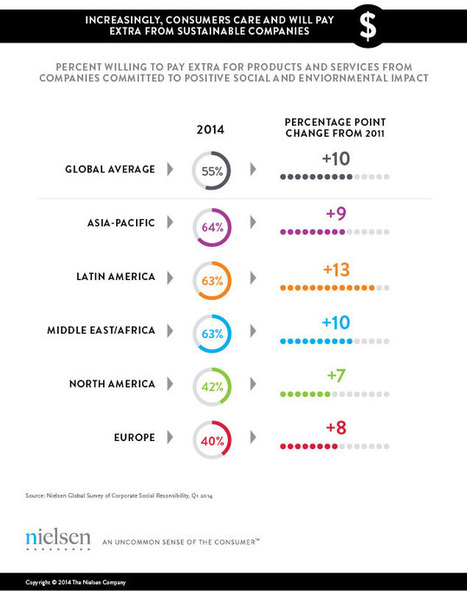


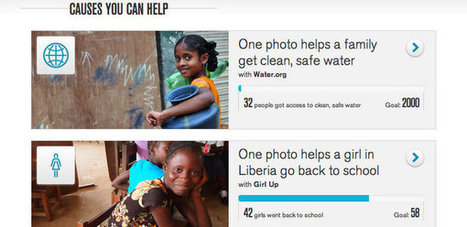


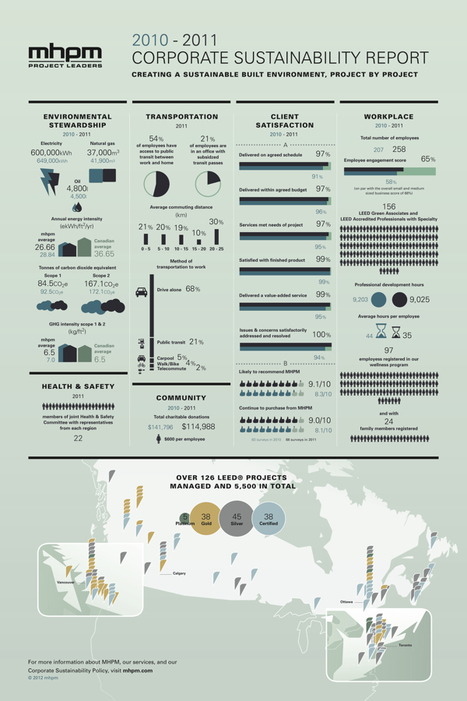





Political tensions have reached a point where some brands perceive mainstream news outlets as too controversial for their ads.